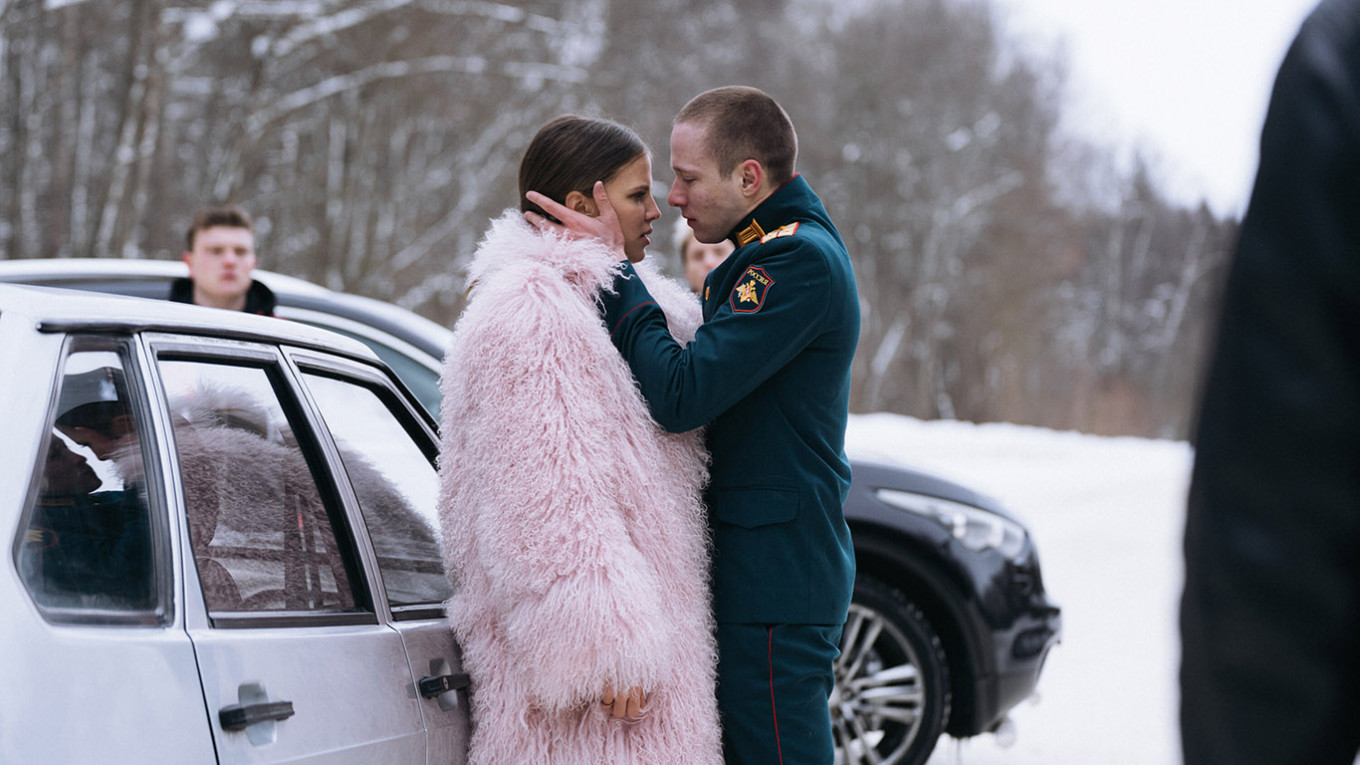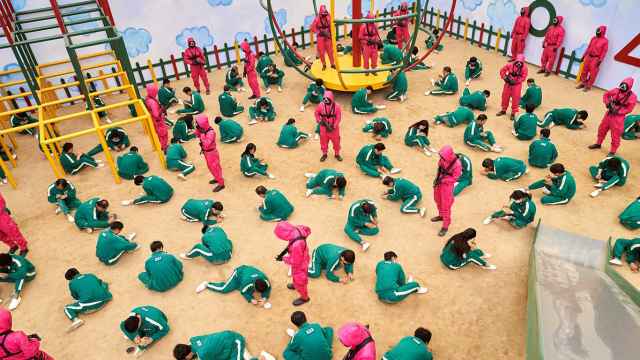A couple is drinking champagne on a private plane from Bangkok to London. The woman falls asleep, but when she wakes up, she catches her fiancé in flagrante with the flight attendant. When the plane touches down to refuel in Vologda, in northern Russia, she escapes, beats up a taxi driver who tries to assault her, steals his car and ends up participating in a karaoke contest at a local bar.
These scenes come from a viral show called “Lilies of the Valley. Such a Tender Love” (Landyshi. Takaya nezhnaya lyubov). Released during the New Year holidays, it quickly became one of the most popular TV series in Russia. Over 2.5 million people watched it on Wink, one of Russia’s leading streaming services, just during the holidays.
At first glance, “Lilies of the Valley” seems like a standard rom-com. But set in the days before Russia’s full-scale invasion of Ukraine, the tensions are palpable — not just between the characters, but throughout the country.
Its current rating on Kinopoisk stands at 8.3, with over half a million votes. It also holds the 79th spot in Kinopoisk’s all-time top 250 TV series, ahead of fan favorites like “Stranger Things” and “Brigada,” a cult classic about 1990s gangsters. On Feb. 23, the STS channel will begin broadcasting the show on TV.
The show’s unprecedented popularity comes despite its often atrocious acting and wildly implausible plot. The main plot revolves around a budding romance between London socialite Katya and Lyokha, a Russian army officer. Katya enlists Lyokha’s help to fend off local gangsters and her fiancé’s father, who is scheming to take control of her inheritance. To facilitate that, they get married Las Vegas style by paying a bribe to a bureaucrat at a local ZAGS (civil registration office).

After getting married Katya hides on the territory of the military base where Lyokha serves. The base is portrayed in an idealized light: Lyokha and Katya are given a spacious apartment (though the shower is broken), the shop on the base sells everything — including potted flowers (where Lyokha buys the titular lilies of the valley for Katya), and there is genuine camaraderie among the officers.
In a surprising twist, “Lilies of the Valley” is a musical. Characters break into song and dance in the most unexpected places, from the ZAGS office to a children’s sporting event at the base.
Music plays a central role, and the title song, “Samolyoty” (Planes) by relative newcomer Zhenya Trofimov, is a catchy folk-pop tune. The refrain, whether intentionally or not, brings to mind Russia’s post-2022 flight restrictions: "Do you want me to fly in tomorrow? But where are those planes?"
The real surprise, however, is that the show directly depicts the days leading up to Russia’s full-scale invasion of Ukraine — something unprecedented on Russian TV. Early on, there’s talk of the base moving to combat readiness. During a double celebration of Defender of the Fatherland Day (Feb. 23) and Katya and Lyokha’s wedding, all officers are suddenly summoned and transported to the front line.
The show follows Russian propaganda law to the letter. In one scene, when the officers’ wives discuss the invasion, one refers to it as a “war,” only to be immediately corrected: “It’s a special military operation.”
“Lilies of the Valley” also promotes “traditional” values. Katya’s new friend and neighbor — a fellow officer’s wife — tells her that life on the base is exactly what she dreamed of: being with her husband and raising their children.
Lyokha is full of machismo and embodies patriarchal ideals. After his and Katya’s rushed wedding, he demands they consummate the marriage — even though he knows it’s a sham. He also insists Katya cook, clean and fulfill the traditional duties of a wife. Some reviewers have noted these tendencies on TikTok, while others posted videos proclaiming Lyokha the ideal husband. Gradually, Katya starts accepting her new role, wearing military-style clothes and taking an active part in the base’s life.

The finale takes a surreal turn: Lyokha goes missing in action in Ukraine, and Katya, in response, forms a girl band to perform for soldiers at the front lines. Given the show’s runaway success, a second season seems almost inevitable.
Interestingly, the series was at least partially funded by the Institute for Internet Development (IRI). Established with backing from the Russian presidential administration, the IRI allocates state funds to create “patriotic” media content and also financed another hit show, “The Boy's Word: Blood on the Asphalt.”
The massive success of “Lilies of the Valley,” particularly with younger audiences, highlights how state propaganda can be wrapped in escapist storytelling. The series borrows tropes from Western romcoms, but its core message is far from subtle: “Serve your country and good things will happen — you might even land a hot billionaire’s daughter if you play your cards right.”
A Message from The Moscow Times:
Dear readers,
We are facing unprecedented challenges. Russia's Prosecutor General's Office has designated The Moscow Times as an "undesirable" organization, criminalizing our work and putting our staff at risk of prosecution. This follows our earlier unjust labeling as a "foreign agent."
These actions are direct attempts to silence independent journalism in Russia. The authorities claim our work "discredits the decisions of the Russian leadership." We see things differently: we strive to provide accurate, unbiased reporting on Russia.
We, the journalists of The Moscow Times, refuse to be silenced. But to continue our work, we need your help.
Your support, no matter how small, makes a world of difference. If you can, please support us monthly starting from just $2. It's quick to set up, and every contribution makes a significant impact.
By supporting The Moscow Times, you're defending open, independent journalism in the face of repression. Thank you for standing with us.
Remind me later.






